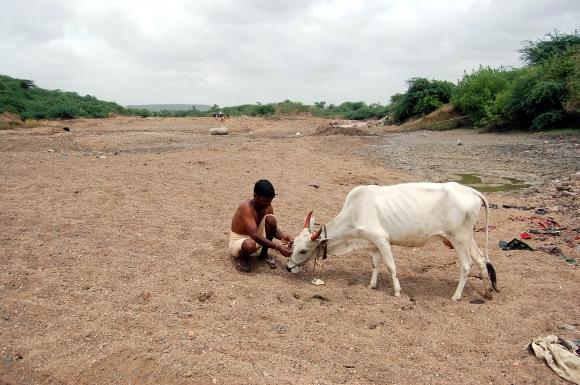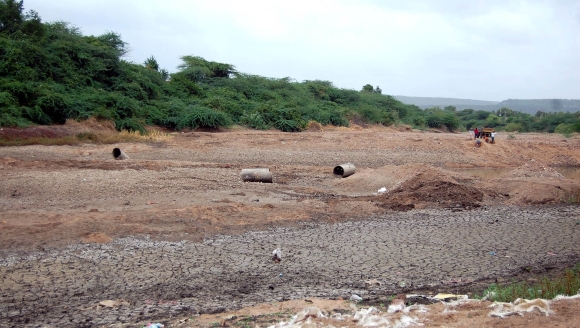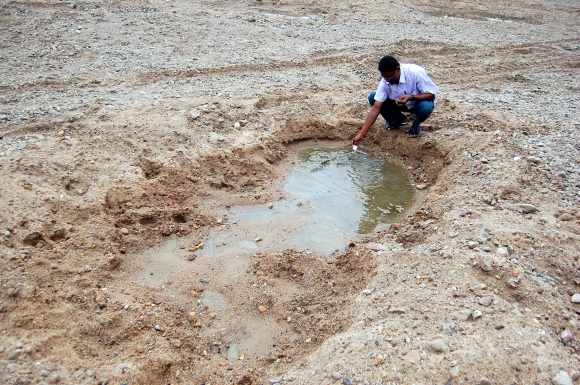
Crops have failed, people don't have jobs and there is no drinking water. Vicky Nanjappa reports on the abysmal reality of drought-hit northern Karnataka
Cattle meant to till the soil end up at the butcher's slab and farmers meant to toil in their lands work as construction workers for a paltry pay as the drought in Karnataka assumes severe proportions
In north Karnataka, which has been worst hit by the drought, farmers are struggling to make ends meet. They barely have any food for themselves or their cattle, the fields are parched and the water supply is dwindling.
The only way the farmers can earn money is by selling off their cattle and agricultural land. But that also means giving up their only source of livelihood.
June is considered to be the most crucial period for agriculture. But this year, the month of June and large periods of July have remained dry. Karnataka has only received 30 per cent of the expected rainfall.
Ramanna, who owns nearly six acres of land in Haveri in north Karnataka, has been praying incessantly for rains. "I have waited a long time. Leaders visit us and give assurances, but the funds are taking way too long to come. Even if it rains today, it will be too late since the time to sow is over".
Jawar, paddy, maize, wheat, bajra, sunflower and ground nuts are the major crops that are grown in this part of Karnataka. The paddy crop, which needs a perfect monsoon to grow perfectly, has suffered the most.
During years of scanty rainfall, farmers use other sources of water for irrigation. But this year, the horrific drought has dried up even those sources.
Manjunath, who owns a small tract of land, had purchased two buffaloes last year for Rs 30,000. He had taken a loan and decided to pay it back with his earnings from this year's crop. But till now, he has not been able to start work on his fields. The buffaloes remained idle in their shed and Manjunath had to continue feeding them by digging into his meagre resources.
"I was able to do it for some time, but then the money dried up. I had no option but to sell the buffaloes for only Rs 10,000," he said.
Click on NEXT for more...

P Chatradmath, an employee of the Agriculture Produce Marketing Corporation, confirms that the situation is grim.
"The villages look empty and there is no stock in the yard since there has been no produce at all. It is sad to see the farmers leaving everything behind and going in search of other jobs," he said.
Many farmers are being forced to sell their cattle to butchers to earn some money.
The Karnataka government, which has been trying to pass the anti-cow slaughter bill, made a feeble attempt to save these cows from slaughter by setting up cattle sheds in the drought-hit regions. But these sheds don't have adequate water or fodder and the farmers have no guarantee that their cattle will survive there.
During a good monsoon season, a farmer can earn at least Rs 200 on a daily basis. This year, farmers are leaving their villages behind to look for alternative sources of livelihood. They often end up working as construction labourers, earning Rs 50 to Rs 100 per day. In most cases, the farmers leave their wives and children behind and migrate to other states to earn a living.
The story is somewhat similar in Mysore district, where farmers had planted ragi this year, but lack of adequate rainfall ruined the entire crop. People from Chamrajnagar taluk have left their villages in search of jobs as construction workers and cleaners in Mysore. With a meagre income of Rs 100 per day, they have to provide for their entire family.
Click on NEXT for more...

The central government's flagship National Rural Employee Guarantee Act was put in place with much pomp to provide assured livelihood even in impoverished regions of rural India. But as those who own a piece of land cannot take up jobs under NREGA, many helpless farmers are being forced to fend for themselves under dire circumstances.
Meanwhile, contractors at construction sites in Bangalore and Mysore are finding it difficult to provide jobs for the increasing number of migrants. G Krishna, a contractor in Mysore, said, "They come from areas in Mysore, northern Karnataka and from other states. At times, we take in such people, but there is not so much demand for manual labour".
The drought has also dried up all sources of drinking water in these parched areas. A case in point is the village Thimmasandra, which relies on just one borewell, located 4 kms away, for its water supply. While the men go out in search for jobs, the women of the village go out to fetch water. They take an hour to reach the borewell and then have to wait for two more hours to fill a bucket of water.
However, local leaders claim that they are doing everything they can to help the beleaguered farmers.
"The problem is immense. The crops have failed, people don't have jobs and there is no drinking water. We have managed to get some funds to provide water. But the main sources of water are drying up. The main source of water, the Almatti, has recorded a significant dip this year," he said.
Some drought-hit villages get water only once in ten days. To make matters worse, the authorities have advised them not to drink this water since it contains high amounts of salt and is not suitable for consumption.
Click on NEXT for more...
...